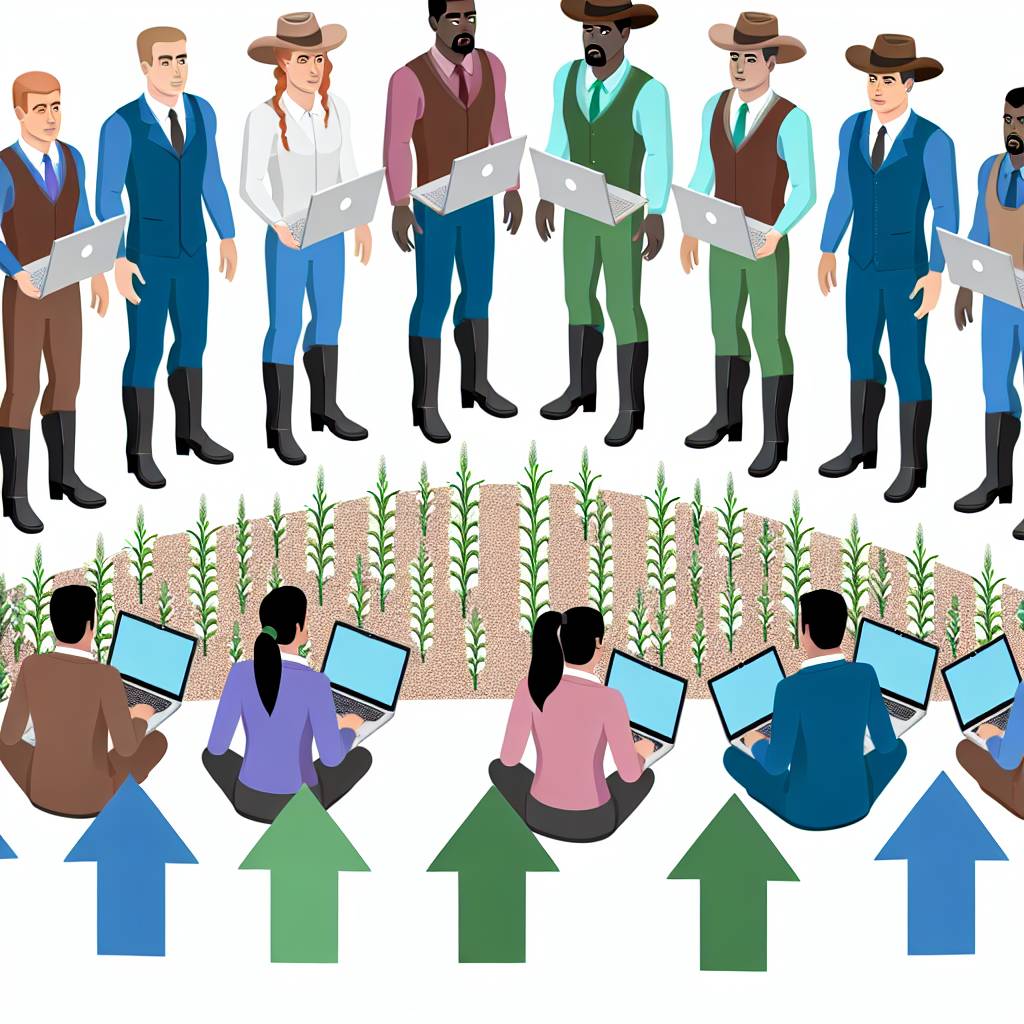Introduction
Extension agents play a vital role in bridging research and communities.
They provide valuable agricultural knowledge.
Training the next generation of extension agents is crucial.
This training ensures the sustainability of agricultural development.
Overview of extension agent training programs
Extension agents play a crucial role in providing valuable agricultural knowledge and resources to farmers and communities.
Training programs are essential in preparing the next generation of extension agents to effectively carry out their duties.
Types of programs available
- University programs: Many universities offer degree programs in agriculture, sustainable farming, and related fields that can provide a strong foundation for individuals looking to become extension agents.
- Internships: Hands-on experience through internships with established extension agencies can offer practical skills and insight into the day-to-day responsibilities of extension agents.
- Certification programs: Some organizations offer certification programs specifically designed for individuals interested in pursuing a career as an extension agent.
Requirements and qualifications for becoming an extension agent
Becoming an extension agent typically requires a combination of education, experience, and specific qualifications:
- Educational background: A bachelor’s or master’s degree in agricultural science, extension education, or a related field is often required.
- Experience: Hands-on experience working in agriculture or related fields is highly beneficial for aspiring extension agents.
- Communication skills: Strong interpersonal and communication skills are essential for effectively engaging with farmers and community members.
- Passion for agriculture: A genuine passion for agriculture and a desire to help farmers succeed are important qualities for extension agents.
Duration of training programs
The duration of training programs for extension agents can vary depending on the type of program and the individual’s educational background:
- University programs: Degree programs can range from two to four years, depending on whether the student is pursuing a bachelor’s or master’s degree.
- Internships: Internship programs can range from a few months to a year, giving participants a hands-on experience in the field.
- Certification programs: Certification programs may vary in length but typically cover essential skills and knowledge needed for the role of an extension agent.
Extension agent training programs play a vital role in preparing individuals to become knowledgeable, skilled, and effective extension agents.
These agents can make a positive impact on farmers and communities.
When it comes to training the next generation of extension agents, there are several important skills and knowledge required for success.
Let’s delve into these key aspects one by one.
Communication Skills
- Effective communication is crucial for extension agents.
- They need to be able to clearly convey information to farmers and community members.
- Strong listening skills are also essential to understand the needs of the people they work with.
- Being able to communicate in different languages or dialects can be a valuable asset.
Knowledge of Agriculture, Horticulture, or Other Relevant Fields
- Extension agents must have a solid foundation in agricultural practices.
- They need to be well-versed in topics such as crop production, soil health, and pest management.
- Knowledge of horticulture, livestock management, or agribusiness can also be beneficial.
- Staying up-to-date on the latest research and trends in the industry is crucial.
Problem-Solving Abilities
- Extension agents often work with farmers facing complex challenges.
- They need to be able to identify issues and develop viable solutions.
- Critical thinking skills are essential for analyzing problems and creating innovative strategies.
- Collaborating with experts in different fields can help address challenging issues.
Extension agents play a vital role in supporting agricultural communities and fostering sustainable practices.
Possessing strong communication skills helps them connect effectively with communities.
A deep knowledge of relevant fields enables these professionals to provide insightful guidance.
Effective problem-solving abilities allow them to overcome challenges innovatively.
Training programs for the next generation of extension agents should prioritize these key skills and knowledge areas.
You Might Also Like: Best Practices for Agricultural Loan Underwriting
Importance of Mentorship in Extension Agent Training
Mentorship plays a crucial role in the training of extension agents.
It provides guidance and support throughout their development.
Transform Your Career Today
Unlock a personalized career strategy that drives real results. Get tailored advice and a roadmap designed just for you.
Start NowRole of Experienced Extension Agents as Mentors
Experienced extension agents serve as mentors by sharing their knowledge.
They provide expertise and best practices to trainees.
Benefits of Mentorship for the Trainees
- Knowledge transfer: trainees benefit from valuable insights and experiences of mentors.
- Professional development: mentorship helps trainees grow professionally and improve skills.
- Networking opportunities: mentors introduce trainees to important industry contacts.
Examples of Successful Mentorship Programs
- USDA Mentorship Program pairs experienced extension agents with new recruits for one-on-one mentorship.
- Many land grant universities have mentorship programs to support extension agent trainees.
- Some companies collaborate with extension agencies to provide mentorship opportunities for trainees.
Mentorship is a valuable component of extension agent training.
It offers numerous benefits for both mentors and trainees.
The next generation of extension agents must receive guidance from experienced professionals.
This support enables them to excel in their roles.
Learn More: How to Assess Water Quality for Irrigation Systems
Field experience opportunities for trainee extension agents
- Hands-on experience working with farmers and other community members
- Learning how to apply theoretical knowledge in real-world situations
- Benefits of field experience in shaping future extension agents
Hands-on experience working with farmers and other community members
Extension agents-in-training have the unique opportunity to work directly with farmers and other community members.
This hands-on experience allows them to understand the challenges and needs of those they will be serving in the future.
By interacting with farmers in the field, trainee extension agents gain valuable insight into daily tasks, practices, and concerns.
Such experience helps them develop empathy and a deeper understanding of the individuals they will work with as extension agents.
Learning how to apply theoretical knowledge in real-world situations
Field experience provides trainee extension agents the opportunity to put their theoretical knowledge into practice.
While classroom learning is essential, true understanding comes only through real-world application.
By working side by side with experienced extension agents and farmers, trainees learn to apply academic knowledge to solve practical problems.
This experience bridges the gap between theory and practice, preparing future extension agents for career challenges.
Impact of field experience on developing future extension agents
Field experience plays a crucial role in shaping future extension agents.
It provides a well-rounded education combining theoretical knowledge with practical skills.
Trainee extension agents develop critical thinking, problem-solving, and communication skills essential for effective extension work.
Moreover, field experience helps trainees build relationships with farmers and community members.
These relationships establish trust and respect necessary for successful collaboration.
Transform Your Career Today
Unlock a personalized career strategy that drives real results. Get tailored advice and a roadmap designed just for you.
Start NowOverall, field experience is an invaluable part of training the next generation of extension agents.
Discover More: Career Outlook for 4-H Youth Development Agents

Professional Development Opportunities for Extension Agents
Continuing Education Programs
Extension agents must regularly participate in continuing education programs.
These programs help them stay updated with the latest industry trends and best practices.
They provide valuable insights into new technologies, research findings, and outreach strategies.
By equipping themselves with updated knowledge and skills, agents can better serve communities.
Workshops and Conferences Related to Extension Work
Attending workshops and conferences focused on extension work is essential for professional growth.
These events offer chances to learn from experts in the field and network with peers.
Agents gain hands-on experience through interactive sessions and field trips at these events.
Participation helps extension agents enhance expertise and strengthen community impact.
Importance of Staying Current with Industry Trends and Best Practices
Extension agents must keep up with evolving industry trends to meet stakeholder needs.
Staying informed allows agents to provide accurate, timely information to their clients.
They can tailor programs to address emerging challenges and align strategies with standards.
Continuous learning ensures the relevance and impact of extension work in a dynamic environment.
Professional Growth Through Ongoing Learning and Networking
Professional development opportunities play a vital role in equipping extension agents with knowledge and skills.
Continuing education programs, workshops, and conferences offer valuable networking opportunities.
Investing in ongoing learning helps agents better serve communities and stay ahead of trends.
Such commitment enables them to make a lasting impact on the agricultural sector.
Discover More: Extension Agent Impact on Agricultural Policy
Improving Agricultural Practices and Increasing Crop Yields
Extension agents play a crucial role in disseminating up-to-date information and best practices to farmers.
Transform Your Career Today
Unlock a personalized career strategy that drives real results. Get tailored advice and a roadmap designed just for you.
Start NowThey train farmers on the latest techniques in pest management, soil fertility enhancement, and irrigation methods.
Through their guidance, farmers adopt more efficient farming practices.
These practices result in increased crop yields and overall profitability.
Educating Farmers on Sustainable Farming Methods
Well-trained extension agents educate farmers on sustainable farming methods in addition to improving crop yields.
They emphasize the importance of soil conservation, water management, and crop rotation.
These techniques help ensure the long-term health of the land.
Extension agents promote sustainable practices that protect the environment and conserve natural resources.
They also help build resilient farming systems that can withstand challenges such as climate change and market fluctuations.
Strengthening Connections Between Farmers and Extension Services
Extension agents act as a bridge between farmers and agricultural extension services.
They foster stronger connections and enhance communication between these parties.
Regular interactions help agents gain insights into farmers’ needs, challenges, and aspirations.
This information allows extension services to better tailor their offerings to meet farmers’ specific requirements.
Through workshops, training sessions, and on-farm demonstrations, agents build trust and rapport with farmers.
Such relationships create a supportive environment for knowledge sharing and skill development.
Role of Extension Agents in Empowering Sustainable Agricultural Growth
The impact of well-trained extension agents on communities is profound.
They improve agricultural practices and increase crop yields effectively.
These professionals also educate farmers on sustainable methods that protect natural resources.
Additionally, agents strengthen ties between farmers and extension services for better collaboration.
Their knowledge, skills, and dedication empower farmers to build resilient farming systems.
These efforts ensure the future success and sustainability of agriculture within the community.
Transform Your Career Today
Unlock a personalized career strategy that drives real results. Get tailored advice and a roadmap designed just for you.
Start NowSupporting the Future of Agricultural Extension
Training the next generation of extension agents is crucial for sustainable agriculture.
Investing in programs that provide hands-on training and mentorship benefits future agents.
By supporting these training programs, farmers gain access to essential resources and expertise.
We have a responsibility to cultivate and nurture the talents of young agricultural professionals.
Together, we can create a brighter and more sustainable future for agriculture by supporting these efforts.
Additional Resources
$14 Million Available to Help Train the Next Generation of Farmers




